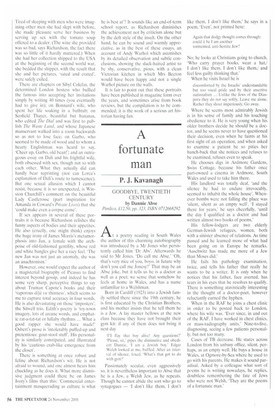A fortunate man
P. J. Kavanagh
GOODBYE, TWENTIETH CENTURY by Dannie Abse Pimlico, £12.50, pp. 323, ISBN 0712668292 At a poetry reading in South Wales the author of this charming autobiography was introduced by a Mr Jones who persistently called him 'Dr Abs'. Afterwards he said to Mr Jones. 'Do call me Abse."Oh, that's very nice of you, boyo, in future why don't you call me Jonesy?' That may be an Abse joke, but it tells us he is a doctor as well as a poet; we sense that somehow he feels at home in Wales, and has a name unfamiliar to a Welshman.
Born in Cardiff (1923) into a Jewish family settled there since the 19th century, he is first educated by the Christian Brothers, and his mother insists that he tell them he is a Jew, A lay master bellows at the new class because they have not brought their gym kit: if any of them does not bring it next day
-I'll flay that boy alive! Any questions?' 'Please, sir,' pipes the diminutive and obedient Dannie, 'I am a Jewish boy: Edgar Welch looked at me, baffled. After an interval of silence, foxed. 'What's that got to do with gym?'
Passionately secular, even aggressively so. it is nevertheless important to Abse that he is a Jew, a Welsh Jew, as he repeats. Though he cannot abide the sort who go to synagogues — 'I don't like them, I don't
like them, I don't like them,' he says in a poem, 'Even', not printed here:
Again that dodgy thought comes through: could it he I am another tormented. anti-Semite Jew?
No; he looks at Christians going to church, 'Who carry prayer books, wear a hat./ I don't like them, I don't like them,/ and feel less guilty thinking that.'
When he visits Israel he is
discomforted by the Israelis' understandable but too vocal pride and by their assertive nationalism ... Unlike the Jews of the Diaspora they do not say softly, Leave me alone. Rather they shout imperiously. Go away.
Where he seems most admirably Jewish is in his sense of family and his touching obedience to it. He is very young when his older brothers decide he should be a doctor, and he seems never to have questioned their decision, even when he faints at his first sight of an operation, and when asked to examine a patient he so pities her hunch-back that she notices and refuses to be examined, refuses even to speak.
He chooses digs in Ardmore Gardens, Swiss Cottage, because his father once part-owned a cinema in Ardmore, South Wales and used to take him there.
His landlord was totally deaf, 'and the silence he had to endure irrevocably, seemed to inhabit the whole house'. Whenever bombs were not falling the place was 'silent, silent as an empty well'. 'I stayed there for years,' he says cheerfully, 'until the day I qualified as a doctor and had written almost two books of poems.'
His fellow-lodgers are two elderly German-Jewish refugees, women, both with a sinister absence of relations. As time passed and he learned more of what had been going on in Europe he remarks, 'Auschwitz has made me more of a Jew than Moses did.'
He fails his pathology examination, twice, and tells his father that really he wants to be a writer. It is only when he notices that his father, face averted, has tears in his eyes that he resolves to qualify. There is something atavistically interesting in the thought of a doctor-poet, however reluctantly earned the hyphen.
When in the RAF he joins a chest clinic in order to be posted back to London, where his wife was. 'Ever since, in and out of the RAF. I have worked in chest clinics, or mass-radiography units.' Nine-to-five, diagnosing, seeing a few patients personally, but not too many.
Cases of TB decrease. He stares across London from his unbusy office, silent, perhaps, as an empty well. He buys a house in Wales, at Ogmore-by-Sea where he used to go with his parents. He makes it sound paraclisal. Asked by a colleague what sort of poems he is writing nowadays, he replies, doubtless remembering the fate of Jews who were not Welsh, 'They are the poems of a fortunate man.'


















































































 Previous page
Previous page